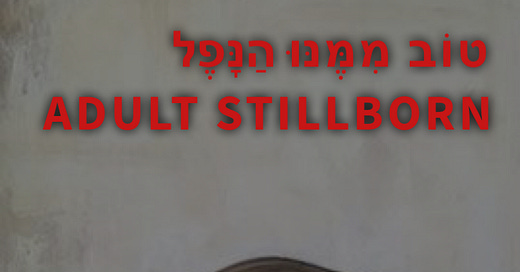Kohelet doesn’t shy away from the raw and the unsettling. In today’s 6th chapter the author pushes the existential crisis to its bleakest edge, declaring that a stillborn child is better off than a person who lives a long life but never finds satisfaction. It’s a shocking comparison—one that forces us to ask: What does it mean to live a life so empty that never having been born is preferable?
אִם־יוֹלִיד אִישׁ מֵאָה וְשָׁנִים רַבּוֹת יִחְיֶה וְרַב שֶׁיִּהְיוּ יְמֵי־שָׁנָיו וְנַפְשׁוֹ לֹא־תִשְׂבַּע מִן־הַטּוֹבָה וְגַם־קְבוּרָה לֹא־הָיְתָה לּוֹ אָמַרְתִּי טוֹב מִמֶּנּוּ הַנָּפֶל׃
Even if a man should beget a hundred children and live many years—no matter how many the days of his years may come to, if his gullet is not sated through his wealth, I say: The stillbirth, though it was not even accorded a burial, is more fortunate than he.
Kohelet 6:3
Erica Brown, in "Ecclesiastes And the Search for Meaning", unpacks this disturbing, painful metaphor:
“It matters little how much one has if life is full of unavoidable, existential aches. Even wealth and a hundred children cannot compensate for the tragedy of constant dissatisfaction. It would be better not to be born, since no matter how much one can live fully now, the creeping specter of death is always present… Darkness prevails…
Using a stillborn as a metaphor seems both highly dramatic and also highly problematic. Kohelet searches for an image to communicate this nagging despair and settles on a stillbirth… the pain, the loss—the futility of the gestational period, the labor that ironically births only death.”
For Kohelet, dissatisfaction is not just an inconvenience—it is a condition of human existence. No amount of children, wealth, or years can fill the void of an unsatisfied soul. The stillborn, in contrast, never experiences this hunger, never wrestles with the burdens of unmet desires. This is not just about physical death; it is about the death of purpose, the fear that nothing we build, love, or dream will ultimately matter.
This isn’t the first time biblical literature uses this harrowing image. Job, in his own moment of anguish, cries out that he wishes he had been stillborn rather than endure his suffering (Job 3:11-16). But as Brown points out, the comparison is “almost too stark… an overstatement itself borne of entitlement.” It’s as if Kohelet and Job are daring us to push back, to say: No, life—even with its disappointments—must be more than this.
And perhaps the real answer lies in another biblical figure—one whose name itself echoes Kohelet’s refrain: Abel, Hevel, the very word Kohelet uses to declare that all is meaningless vapor. Abel, like the stillborn, dies before his life fully unfolds. But unlike the silent stillbirth, his blood cries out from the ground (Genesis 4:10). His story does not end in nothingness; it leaves a mark and an enduring call to fight for justice.
Brown suggests that Kohelet’s bleakest moments are not meant to be accepted at face value but to provoke a response:
“Ecclesiastes does not provide us with answers but compels us to ask better questions… Perhaps the real challenge of Ecclesiastes is not in resigning ourselves to meaninglessness but in insisting on meaning despite everything.”
And isn’t that the task of every generation? To fight against despair, to challenge Kohelet’s nihilism, to insist that even in the darkest moments, we still find ways to create, to love, to impact the world.
Kohelet may compare an unsatisfied life to a stillbirth, but the rest of the Jewish tradition insists on a different metaphor. If there is breath, there is hope. If there is life, there is possibility. Even Abel, whose life was cut short, was not erased—his call to stand up for the weak, to oppose violence, and to pursue justice and purpose is still heard and calls on us to not lose hope, breath by breath.
Below the Bible Belt: 929 chapters, 42 months, daily reflections.
Become a free or paid subscriber and join Rabbi Amichai’s 3+ years interactive online quest to question, queer + re-read between the lines of the entire Hebrew Bible. Enjoy daily posts, weekly videos and monthly learning sessions. 2022-2025.
Become a Paid Subscriber? Thank you for your support!
#Ecclesiastes #Kohelet #fivescrolls #hebrewbible #כתובים #Ketuvim #Bible #Tanach #929 #קהלת# חמשמגילות #labshul #belowthebiblebelt929 #Kohelet6
#stillborn #lifewithoutmeaning #existentialcrisis #Job #Abel #thecryofabel #purposeinlife #breathbybreath #ericabrown
#peace #prayforpeace #nomorewar



